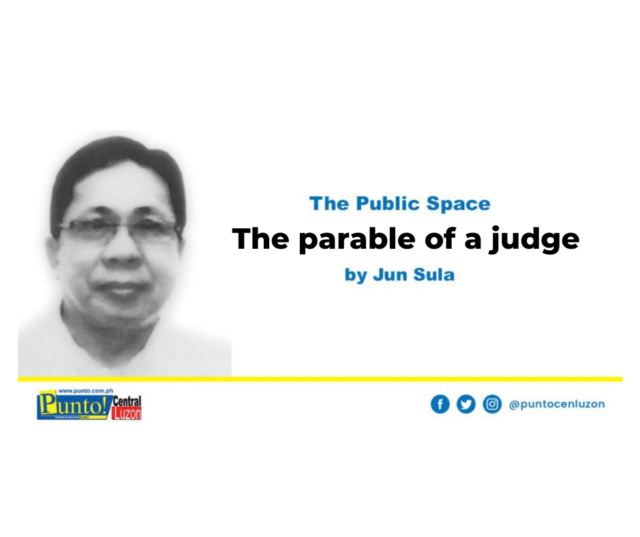There was once a city judge, the New Testament tells in a parable told by Jesus, who stood out in his time for two distinct traits, not necessarily inconsistent: he did not fear God and neither respected man.
Former Senator Leila de Lima is more fortunate in her time and place: no such judge probably exists, at least for one reason. This country stands, as it is used to be proudly described, as the only Christian nation in Asia. That may no longer be true today; there are other neighbors who can make a claim that they are a stronger Christian nation. South Korea is one of them and is known to punish past leaders for wrongdoings.
In the biblical parable, there was also a woman, a widow, to be exact, who kept coming to the city judge, who apparently was annoyed constantly by it. The widow demanded that justice be given to her against her adversary who had wronged her. There were no illegal drugs yet in those days, although the same evil beset the land, as De Lima’s is or has been. The perfect tense makes perfect sense in the former senator’s case. Hence, it’s called a continuing saga for the lamented lawmaker .
The city judge was not bothered by his conscience, obviously, because of two things he didn’t have. Thus, he was more inconvenienced by the constant banging at his gate or his court by the widow than her exhausting pursuit to be avenged against her adversary. Clearly, the enemy was singular but powerful. Power is plural.
In those days, a woman was not only a weaker vessel but a lesser one. In other words, a woman was looked at as second class. One Christian group thinks that’s the same reason de Lima, a woman, has been treated not by just one man, but many, in a land where there are many Christians and there are many lawyers. Misogyny is part of the injustice. It could have been worse, if she were a widow; widows in Jesus’ time, were even more helpless. In De Lima’s case, it is good that she’s a lawyer, a prominent one that.
It took more than six years for a city judge to declared her innocent of one of three criminal case filed against her by her enemies. Respect for men more than fear of God was evident in the judge’s decision. There was no written indication on the dispositive portion of the ruling that a better fear was important. One important witness against her had publicly recanted her own previous damning testimony that De Lima gained financially from the illegal drugs trade. That’s the basis for the judge’s long-delayed decision. In the parable’s unjust judge decision, he just wanted the widow to stop pestering him ,not because it was the just thing to do.
Ironically, it was fear of men, or their process, that made the judge vindicate the former senator. The witness ,who recanted his testimony, said he swore on a lie forced or coerced into him by a powerful man, for fear of a more powerful, if not a most powerful man, for his life or safety. The culture of fear was shared. There were other judges at that time who wouldn’t even touch De Lima’s case with a ten-foot pole for the same reason. Fear bound the eyes of those who could see.
“ If a man has his eyes bound, “Frank Kafka said, “you can encourage him as much as you can tell to stare through the bandage, but he’ll never see anything.’ After the fear was gone, the witness told the truth in court and the judge saw more clearly. Another judge, the last of the three , needs to see as the other judges saw the innocence, without fear, to set De Lima finally free.
In getting her delayed justice, which the oft-quoted maxim equates with being justice denied, and her powerful enemies no longer feared, De Lima believes her prayers have been answered. Leon Tolstoy had penned a short story along that line: God sees the truth and waits. There are always the unconvinced and unrepentant. The justice secretary thinks although the former justice secretary was acquitted, she is still guilty. The former president believed to be behind her incarceration for as long says the judge’s decision was flawed. Other well-known members of a former choir sing the same tune. One of them mainstains that it was karma that did the former senator in.
History is generally viewed to be not random. It generates its own momentum. It goes forward with an agenda of its own and it’s unstoppable. There are many possibilities now for De Lima. One of them is to go legally after those –her adversaries– who maliciously prosecuted her, wasted precious time in her life and deprived her precious rights as citizen and senator. There’s a law to that, another former senator said , but it is a road less taken because it is not financially rewarding damage-wise .
However,there is always the moral side to it. As a victim of human rights violations, a living testimony as collateral damage in the war against drugs, she can add more energy and credence to the pending probe of the International Criminal Court on crime against humanity in the Philippines. Or she can run again for public office where her voice will be heard once more. She has her momentum now and, more than ever, is on the right side of history.
In fine, she has the right role cut out for her. Like the widow in the parable, the least she can do is unrelentingly trouble the judiciary or the judge about injustice in the land. It might just work.





